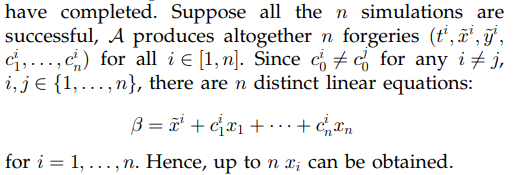In the paper [1,p5], the authors construct a matrix to find out $n$ solutions of a equation set as follows:
where $c_i$ is generated by the adversary, $c$ is picked by the simulator. Note that $c^i$ means different forgeries instead of exponent.
My question is, they find out $n$ solutions iff the determinant equals non-zero, but they don't prove why the determinant equals non-zero. There is no need to prove it?
(I'm not true this is a crypto problem or not, it seems more like a math problem?)
[1] Liu, J. K., Au, M. H., Susilo, W., & Zhou, J. (2014). Linkable ring signature with unconditional anonymity. IEEE Transactions on Knowledge and Data Engineering, 26(1), 157–165. https://doi.org/10.1109/TKDE.2013.17

